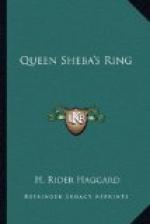“That is impossible,” said some one, “you are the last woman of the true blood.”
“Then you can choose one of blood that is not true, or elect a king, as the Jews elected Saul, for if my guests are butchered I shall die of very shame.”
These words of hers seemed to cow the Council, one of whom asked what would she have them do?
“Do?” she replied, throwing back her veil, “why, be men, raise an army of every male who can carry a sword; help the foreigners, and they will lead you to victory. People of the Abati, would you be slaughtered, would you see your women slaves, and your ancient name blotted out from the list of peoples?”
Now some of them cried, “No.”
“Then save yourselves. You are still many, the strangers here have skill in war, they can lead if you will follow. Be brave a while, and I swear to you that by harvest the Abati shall sit in the city of Harmac and not the Fung in Mur. I have spoken, now do what you will,” and rising from her chair of state Maqueda left the chamber, motioning to us to do likewise.
The end of all this business was that a peace was made between us and the Council of the Abati. After their pompous, pedantic fashion they swore solemnly on the roll of the Law that they would aid us in every way to overcome the Fung, and even obey such military orders as we might give them, subject to the confirmation of these orders by a small council of their generals. In short, being very frightened, for a time they forgot their hatred of us foreigners.
So a scheme of operations was agreed upon, and some law passed by the Council, the only governing body among the Abati, for they possessed no representative institutions, under which law a kind of conscription was established for a while. Let me say at once that it met with the most intense opposition. The Abati were agriculturalists who loathed military service. From their childhood they had heard of the imminence of invasion, but no actual invasion had ever yet taken place. The Fung were always without, and they were always within, an inland isle, the wall of rock that they thought impassable being their sea which protected them from danger.
They had no experience of slaughter and rapine, their imaginations were not sufficiently strong to enable them to understand what these things meant; they were lost in the pettiness of daily life and its pressing local interests. Their homes in flames, they themselves massacred, their women and children dragged off to be the slaves of the victors, a poor remnant left to die of starvation among the wasted fields or to become wild men of the rocks! All these things they looked upon as a mere tale, a romance such as their local poets repeated in the evenings of a wet season, dim and far-off events which might have happened to the Canaanites and Jebusites and Amalekites in the ancient days whereof the book of their Law told them, but which could never happen to them, the comfortable Abati. In that book the Israelites always conquered in the end, although the Philistines, alias Fung, sat at their gates. For it will be remembered that it includes no account of the final fall of Jerusalem and awful destruction of its citizens, of which they had little if any knowledge.




